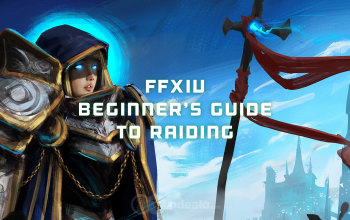Types of Raid Groups
Choosing an appropriate group for your needs and preferences is extremely important at the start. If you choose badly - you will get discouraged and might forgo Raiding altogether. If you choose well - you will have tons of fun and make new friends.
Here is a brief overview of the general group types in Final Fantasy XIV:
|
|
PUG/PF vs Static
PUGs, or Pick-Up groups, are random groups that are assembled on the fly, either automatically - by built-in in-game tools, like Party Finder (PF), or manually - by a Raid leader who wants to dedicate his/her time to assemble a group out of random people. Statics, on the other hand, are pre-made, stable, and organized Raid groups that meet at assigned times to clear content together. Both of them have some advantages and disadvantages:
|
| PUG/PF |
Static |
 You decide when you want to Raid, and you are not on a schedule, however. You decide when you want to Raid, and you are not on a schedule, however. |
 Statics operate on a schedule, you have to show up at a pre-determined time or you will fail your Raid mates. Statics operate on a schedule, you have to show up at a pre-determined time or you will fail your Raid mates. |
|
 PUGs take some time to assemble, so you will have to wait; queue times are a thing. PUGs take some time to assemble, so you will have to wait; queue times are a thing.
|
 Once your group agrees on a schedule, you should start each Raid without the wait... unless someone shows up late, again. Once your group agrees on a schedule, you should start each Raid without the wait... unless someone shows up late, again.
|
 / / Random nature of loot distribution. Everybody rolls a dice and if you happen to roll better than the others, you win. If you're lucky, you can gear up very quickly, if not - it might take months. Random nature of loot distribution. Everybody rolls a dice and if you happen to roll better than the others, you win. If you're lucky, you can gear up very quickly, if not - it might take months. |
 / / Loot queue and other loot systems ensure that you will get something eventually, however, you might get less loot than you would get from a PUG (especially if you are a new addition to a Static). Even if you don't get an item, someone from your Static will - which means that the group as a whole gets stronger, which, in turn, makes beating content easier. Loot queue and other loot systems ensure that you will get something eventually, however, you might get less loot than you would get from a PUG (especially if you are a new addition to a Static). Even if you don't get an item, someone from your Static will - which means that the group as a whole gets stronger, which, in turn, makes beating content easier. |
 Random groups have less coordination and communication problems occur quite often. Random groups have less coordination and communication problems occur quite often. |
 Good coordination (that becomes even better as the group progresses). Voice coms make communication much easier. Good coordination (that becomes even better as the group progresses). Voice coms make communication much easier. |
 / / If you are a shy person, lack of voice communication might be a good thing for you. Just keep in mind that it might make things more difficult. If you are a shy person, lack of voice communication might be a good thing for you. Just keep in mind that it might make things more difficult. |
 Depending on a Static, you might not be required to talk on voice coms, listening is often enough - a plus when you are voice shy. Depending on a Static, you might not be required to talk on voice coms, listening is often enough - a plus when you are voice shy. |
 PUGs tend to be frustrating and sometimes even infuriating - that's what you get when you make a Raid out of random people who often don't blend too well with each other. PUGs tend to be frustrating and sometimes even infuriating - that's what you get when you make a Raid out of random people who often don't blend too well with each other. |
 Playing as a part of well-organized and like-minded Static will increase your fun-factor (if you choose the group well). Playing as a part of well-organized and like-minded Static will increase your fun-factor (if you choose the group well). |
 PUGs might be frustrating, but the frustration is short-lived because you will not get the same people in your PUG again. PUGs might be frustrating, but the frustration is short-lived because you will not get the same people in your PUG again. |
 If you get into a "bad" Static, you might be sucked into some lingering drama that just does not happen in PUGs, as pugs are a one-time-deal. A word of advice - if you notice that your new Static is toxic, just bail as soon as you can. If you get into a "bad" Static, you might be sucked into some lingering drama that just does not happen in PUGs, as pugs are a one-time-deal. A word of advice - if you notice that your new Static is toxic, just bail as soon as you can. |
 If you don't know tactics while in a PUG, prepare to be blamed. A lot. If you don't know tactics while in a PUG, prepare to be blamed. A lot. |
 Statics create a much better environment for learning encounter mechanics and general improvement. Statics create a much better environment for learning encounter mechanics and general improvement. |
| Statics can be divided into three more or less broad categories: |
|
Casual (SoftCore)*
These groups don't take Raiding too seriously and their ultimate goal is to have fun... And maybe get some sweet loot in the process, but fun always comes first for them. Just like all static groups, Casual ones Raid on pre-assigned days but their Raids may be shorter or further between (2-3-hour Raid session once a week, for example). SoftCore groups don't usually try to optimize their Raid composition and don't care about the meta** as much (if at all) as more serious groups do. Casual groups will often accept completely green players and will only kick people out in extreme cases, like very bad attitude and extremely toxic, antisocial behavior.
If you are completely new to FF XIV Raiding, a Casual group might be a perfect place to start. It will offer you a laid-back environment to learn the game mechanics and gain some much-needed experience.
*Please remember that "Casual" is not a pejorative term.
**Most Efficient Tactic Available; You have no idea how many players, who use this abbreviation, have no clue what it stands for.
|
|
HC (HardCore)
The other end of the FF XIV Raiding community spectrum; HardCore groups are all about progression, competing for the best clear times, and advancing in world rankings. Joining a Hardcore Raid Group is like getting a second job; you will be required to subjugate your real life to raiding - these groups Raid often and long (3-4 times a week, 5 hours per session, or more), and they often flat-out require you to improve your gameplay by doing extensive research and learning new tactics from various sources (it's all about the meta here). If your performance turns out to be not up to par with the other group members, you will be replaced without a second thought - competing for the top ranking spots leaves no place for compassion.
If you meet the very high requirements these groups have and are currently considering joining one, you don't need any advice (you are the one who can give advice at that point). However, if you have some raiding experience and want to raid rather seriously, but don't want a second full-time job, you should search for a MidCore group:
|
|
MC (MidCore)
This category is the broadest of the three as it incorporates all Statics that fall somewhere between Casual and Hardcore. Some Midcore groups may describe themselves as semi-casual - rather laid-back, not caring about the meta, but still wanting to get the job done and clear content eventually. Other Midcore groups might label themselves as semi-hardcore - disciplined, striving to optimize their gameplay and intent on achieving good clear times, but not caring about the world rankings and not always striving to do everything in the most efficient way. Of course, everything in between these two examples is also labeled as "Midcore" and most Static groups fall in this category. Most Midcore Statics are likely to accept new players and are willing to let them learn - they also won't boot anyone for underperforming (most of them, that is), unless they simply don't try (or, for some reason, don't want) to improve. These types of groups Raid much more than Casuals, but still much less than the Hardcores - 2 or 3 times a week for 3 to 4 hours is an average, we would say.
A Midcore would be a great place to start if you want to experience the high-end FF XIV Raid content in a well-organized but not too strict environment. This category is extremely broad, so you will definitely find a group that suits your needs, expectations, and schedule. Also, when you decide to switch your current Static in favor of a more serious one, you will most likely end up in another Midcore, just a bit more committed.
|
|
How to find a Static
Important: Before you even start looking for a Static, you should answer a simple question - why do you want to Raid? Do you want to experience the content? Do you want to get better gear? Do you want to challenge yourself? Do you want to become better at the Game? Do you want to progress through the hardest content FF XIV has to offer, or do you want to have fun, above all else? Answering the highlighted question will allow you to set your priorities straight and determine which types of groups you should be looking for, as joining groups that have different priorities than you will lead to frictions sooner rather than later.
There are a few places where you can search for a Static group - you can check the Official FF XIV Forums, FF XIV recruitment subReddits, or dedicated Discord channels, or you can open the in-game Party Finder where Raid leaders advertise their Statics all the time. If you want, you can also advertise yourself, just be aware that you might not get any responses if you don't have any experience - unless you are a Tank or a Healer main; these roles have it much easier.
- Many Raid leaders will want to interview you a little before accepting or denying your submission. Don't get discouraged, these "interviews" usually take the form of noncommital chats about your in-game experience, attitude, and preferred Raiding hours; just be prepared to join the Discord (or TS3, Ventrillo, or whatever else voice-comm software the group uses) provided by the leader.
- When it comes to questions about your experience and skill, just tell the truth - any lies will surface on the very first Boss your new group will attempt, and nobody likes to be lied to. Dishonesty might get you replaced, even if the group would have accepted and kept you if they knew that you are a newbie.
|

 You decide when you want to Raid, and you are not on a schedule, however.
You decide when you want to Raid, and you are not on a schedule, however.  Statics operate on a schedule, you have to show up at a pre-determined time or you will fail your Raid mates.
Statics operate on a schedule, you have to show up at a pre-determined time or you will fail your Raid mates.